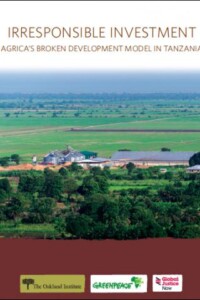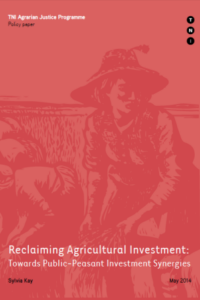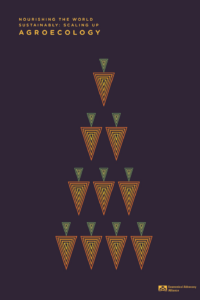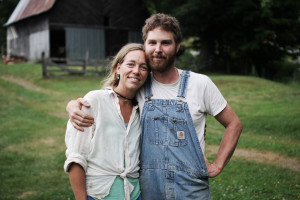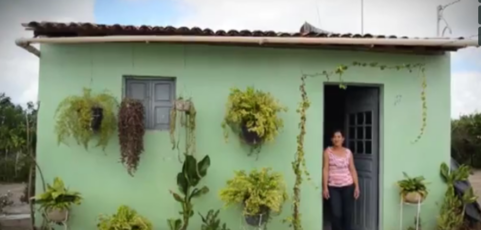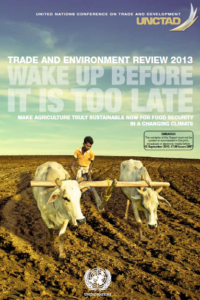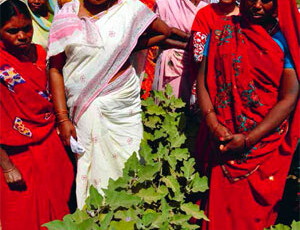This film is produced by MELCA, Ethiopia, in collaboration with the Development Fund Norway, African Biodiversity Network, the Gaia Foundation
Report of the International Forum for Agroecology
“We are pleased to present the report of the International Forum on Agroecology, held at the Nyéléni Center in Sélingué, Mali from 24th to the 27th of February, 2015. This represents the first joint vision of Agroecology from the shared viewpoints of all kinds of small-scale food producing peoples, seen from the perspectives of our social movements. This is the first common statement across constituencies, of the pillars and principles of Agroecology. Read more
REPORT/Irresponsible Investment: Agrica’s Broken Development Model in Tanzania
Norfund, the UK aid department, and Capricorn are funding the British company Agrica’s industrial rice plantation in Mngeta, Tanzania, which is destroying the livelihoods of smallholder farmers, driving them into debt and impacting the local environment, according to new research by The Oakland Institute released in collaboration with Greenpeace Africa and Global Justice Now.
Agrica’s rice plantation in Tanzania has been used as a showcase project of the G8’s New Alliance for Food Security and Nutrition and the Southern Agriculture Growth Corridor of Tanzania.
The report, Irresponsible Investment – Agrica’s Broken Development Model in Tanzania, documents a catalogue of devastating impacts on local communities.
Reclaiming Agricultural Investment
Towards Public-Peasant Investment Synergies
This report argues that there is a need to ‘reboot’ the debate on agricultural investment, away from the narrow corporate centric perspective, towards maximising synergies between public investments and the investments made by small- scale food producers.
Nourishing the World Sustainably: Scaling Up Agroecology
The cases, the research and the studies to which this Report refers clearly show that in Africa, Asia and Latin America there are many Ngos and farmer-led initiatives promoting agroecological production that have demonstrated a positive impact on the livelihoods of millions of people living in small farming communities. Read more
Youth and agriculture: new think-tanks for family farming
Three young authors associated with the Africa Family Farming Workshops write about the importance of creating a dialogue between family farmers, scientists and policy makers. The Africa Family Farming Workshops is an interdisciplinary, regional think-tank that facilitates innovative collaboration.
Farmers in Focus: Advocate for sovereign seed systems
Holly Whitesides and her husband are trying to go “against the grain” of industrial agriculture in the United States. They use their family farm and their work on saving seed to convince other farmers and groups of the importance of a sovereign seed stock.
Brazil launches the Agroecology Plan
Brazil launches the Agroecology Plan and Organic Production. It was announced by the President Dilma Rousseff the 17 October, during the Second National Conference on Sustainable Rural Development, in Brasilia. The Plan aims to coordinate policies and actions for an environmental-friendly agriculture and the organic food production, with an initial investment of 8.8 billion allocated to 125 initiatives all over the country.
This is the result of an intense dialogue between the government and civil society representatives gathered in the national committee that was established by presidential decree in 2012 in order to develop the Plan.
Just one day prior to the announcement, the Ministry of Agriculture, in Brasilia was occupied by the protest of the Brazilian farmers demanding “global action on food sovereignty” as part of World Food Day celebrations.
Although civil society proposals have not been fully included in the final version of the document, there is a general consensus on the fact that the Plan marks an historic moment, an important step foward in the direction of a more sustainable peasant agriculture, especially in a country such as Brazil where the agribusiness model still keeps on maintining a great influence on government policies, due to its economic importance.
See also:
- http://aspta.org.br/2013/10/dilma-lanca-plano-nacional-de-agroecologia-e-producao-organica/
(article in Portuguese) - The Agroecology Plan: Brasil Agroecológico Plano Nacional de Agroecologia e Produção Orgânica
(PDF in Portuguese) - The official presentation (PDF in Portuguese)
Brasil Agroecológico. A video produced by the Brazilian governemnt for the launching of the Plan.
Wake up before it is too late
The report Wake up before it is too late. Make agriculture truly sustainable now for food security in a changing climate has been just released from UNCTAD (United Nations Conference on Trade and Development). Among the key messages, this report clearly states the need for a shift from conventional, monoculture based agriculture towards ecological food production systems.
SRI in Bihar: From one to 350,000
Farmers in Bihar were initially sceptical when they heard about the System of Rice Intensification, five years ago. Only one farmer decided to try it. From then, first by word of mouth and now with government support,

